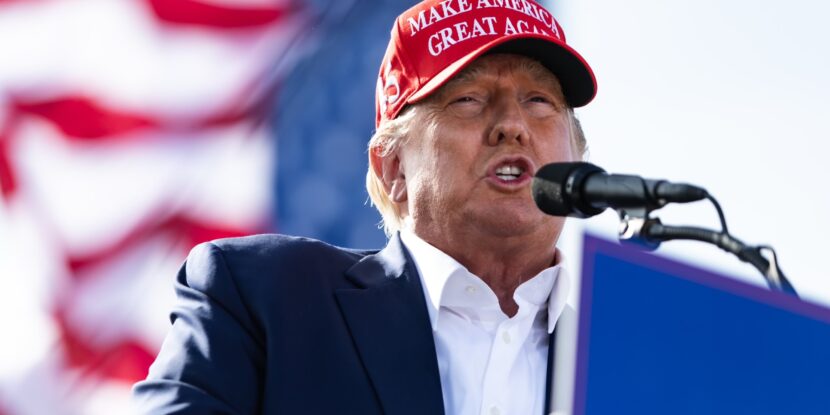A nearly four-year-old lawsuit against former President Donald J. Trump, the Trump presidential campaign, and the Republican National Committee (RNC) could severely restrict efforts to prevent voter fraud and ensure the integrity of the 2024 election.
If U.S. District Court Judge Tanya Chutkan finds in favor of the plaintiffs before November’s election, the Republican Party and Trump campaign would be forced to seek pre-approval from a federal judge before challenging the validity of any ballot, election certification, or decision to wave state election procedures.
The lawsuit, Michigan Welfare Rights Organization v. Trump, has largely sat dormant since being filed in November 2020. However, Judge Chutkan—a far-left federal judge who is also presiding over special counsel Jack Smith’s January 6 prosecution of Trump—recently accepted an amended filing from the plaintiffs, signaling movement in the case. The plaintiffs dropped a civil penalty request against Trump, acknowledging it likely ran afoul of the U.S. Supreme Court’s recent presidential immunity ruling.
“It’s been pending for a long time. At a certain point, a failure to decide means that it effectively denies the plaintiffs their remedy,” Judge Chutkan told attorneys for both sides late last year. Despite her comments, however, she has yet to make any substantial rulings on the matter.
ALLEGED INTIMIDATION.
Brought by three Michigan voters—represented by the Michigan Welfare Rights Organization—the lawsuit alleges Donald Trump, his campaign, and the RNC repeatedly violated the Voting Rights Act of 1965 (VRA) and the Ku Klux Klan Act. The two federal laws both contain provisions that bar the disenfranchisement of minority voters. Following its initial filing, the National Association for the Advancement of Colored People (NAACP) has also joined as a plaintiff.
The plaintiffs allege during the 2020 election, former President Trump, his campaign, and the RNC “…sought to overturn the result of the election by disenfranchising voters, in particular voters of color in several major metropolitan areas.”
They claim that actions such as “attempting to slow and stop vote counting efforts in tightly contested states” and “challenges to the validity of ballots” undertaken by the Trump campaign and RNC violate Section 11(b) of the Voting Rights Act as well as the Ku Klux Klan Act. The VRA states: “No person, whether acting under color of law or otherwise, shall intimidate, threaten, or coerce, or attempt to intimidate, threaten, or coerce any person for voting or attempting to vote, or intimidate, threaten, or coerce, or attempt to intimidate, threaten, or coerce any person for urging or aiding any person to vote or attempt to vote.”
Meanwhile, the Ku Klux Klan Act—a federal law dating to 1871—makes it a federal offense to conspire to deprive citizens of their right to vote or hold office. While the law has specific provisions aimed at the Klan, it also provides for monetary and injunctive relief against those found to be engaging in voter and candidate intimidation.
THE 1981 CONSENT DECREE.
The RNC was subjected to similar legal supervision in 1982 after settling a lawsuit brought by the Democratic National Committee (DNC). In 1981, the RNC founded a group called the National Ballot Security Task Force (BSTF) to monitor the integrity of the New Jersey governor’s election that year. The DNC filed a federal lawsuit claiming the group’s purpose was to engage in illegal harassment and voter intimidation in an effort to discourage election turnout in minority-populated areas of the state.
Under a consent decree signed by the RNC as part of the legal settlement, any ballot security activities they engaged in required pre-approval by a federal judge. Additionally, the RNC was prevented “from engaging in activities that suppress the vote, particularly when it comes to minority voters.” The consent decree expired in 2018 despite efforts by the Democratic Party to convince a federal court to extend the agreement’s provisions.
A MOTION TO DISMISS.
In January of last year, attorneys for the Trump campaign filed a motion to dismiss the case on First Amendment grounds. They contend that the plaintiffs “seek to use important civil rights statutes to improperly restrict constitutionally protected speech and stymie President Trump’s, and future Republican candidates’, efforts to ensure safe and secure elections.”
Additionally, the Trump campaign attorneys argue the lawsuit essentially asks for “prior restraint” from the court “…to restrict the political speech and activities of a current presidential candidate and all future Republican candidates for public office with whom they disagree.”
The Trump campaign’s motion to dismiss also notes that the plaintiffs’ evidence is mostly just social media posts, public statements, a press conference regarding a voter fraud investigation, as well as telephone calls and in-person conversations with election officials. They contend that none of the listed activities amounts to voter intimidation or an attempt to disenfranchise voters.
Judge Chutkan has yet to rule on the Trump campaign’s motion to dismiss.


